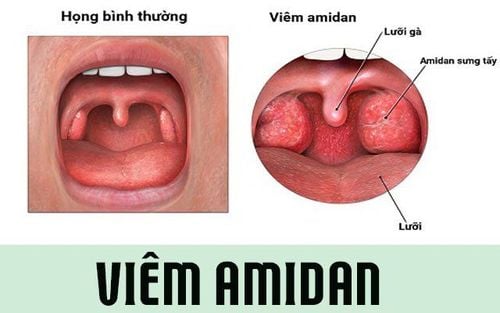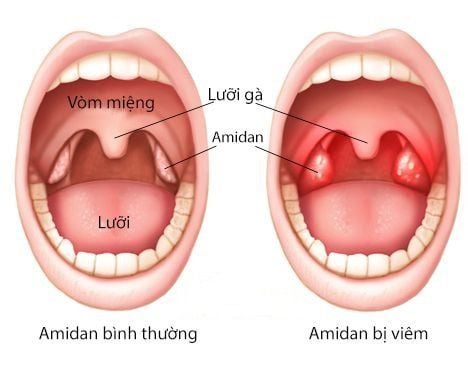This is an automatically translated article.
The article was professionally consulted by MSc Dang Thi Thuy Trang - Ear, Nose and Throat specialist, Vinmec Central Park International General Hospital.The tonsils act as a "fence" to protect the body against the invasion of microorganisms through the respiratory tract, so it is easy to be swollen and inflamed. Tonsillitis usually occurs in young children. However, the disease also occurs in adults, and manifests with a persistent and recurrent state, even causing many dangerous complications.
1. What is tonsillitis?
The tonsils are the name for a system of lymphatic organization, which is responsible for protecting the body from the invasion of bacteria. When detecting bacteria, this organ immediately catches, creates antibodies or performs phagocytosis with biochemical enzymes to destroy them, preventing bacteria from penetrating deep inside.
Acute tonsillitis is a congestive and exudative inflammation of the palatine tonsils. This pathology is common in school-age children (5-15 years). When bacteria massively invade and attack the nasopharynx, the tonsils have to work too hard to resist, thereby appearing an inflammatory response, manifested as swelling, redness, and pain.

Viêm amidan cấp tính là tình trạng viêm xung huyết và xuất tiết của amidan khẩu cái
2. Tonsillitis can still occur in adults
The tonsils are formed from birth, most active in the first years of life with local immune function in the oropharynx. After puberty, the immune system in other organs is complete, the tonsils will gradually atrophy and degenerate. However, it should not be subjective, thinking that tonsillitis will not occur in adults, because if the body is frequently infected again and again, due to a polluted environment or a weak immune system, the tonsils will be activated leading to to a chronic inflammatory process that persists into adulthood.
Although with a lower rate, tonsillitis in adults is also common in the form of acute episodes of tonsillitis on the background of chronic inflammation, which recurs many times. Depending on the degree of inflammation and the body's response, the inflamed tonsils may become enlarged (inflammation) or not (atrophic sclerosis).
3. Cause
The causative agent of tonsillitis can be bacteria such as group A β-hemolytic streptococci, S.pneu hemophilus, staphylococci, streptococci, spirochetes, aerobic and anaerobic strains; viruses such as flu, measles, whooping cough...
If you have allergies, poor resistance, sensitivity to sudden weather changes (temperature drops quickly when it's raining, windy, high humidity...), Polluted environment will create favorable conditions to cause tonsillitis in adults.
In addition, living conditions, poor hygiene, there are foci of infection in the throat and mouth such as tooth decay, gingivitis, V.A., sinusitis ... will be a hiding place and growth of bacteria, causing prolonged tonsillitis.

Liên cầu là tác nhân gây viêm amidan
4. Symptoms
Symptoms of tonsillitis in adults are similar to those in children but may be less intense. However, in acute episodes, the patient may still feel cold and shivery followed by a high fever with a body temperature of up to 39-40 degrees Celsius. At the same time, the patient also feels lethargic, tired, headache, sore throat, trouble swallowing, painful swallowing, loss of appetite.
Go to the pharynx examination and find the tonsils swollen and red on both sides of the nasopharynx, sometimes covering most of the midline. Sometimes, on the surface of the face, two red swollen tonsils are white pus dots, easy to peel and very foul.
For the case of chronic tonsillitis, in addition to the acute relapses as above, the patient is often thin, pale and often has a smoldering fever in the afternoon. Sometimes patients come to the clinic because of cough, hoarseness, feeling of swallowing difficulty, prolonged pain in the throat like a foreign body in the throat, bad breath despite thorough oral hygiene. A few have wheezing, loud snoring, so it's easy to mistake it for other diseases. The cause can only be detected in the tonsils if many slits and cavities are seen, filled with white pus-like substance on the surface of the tonsils.
5. Is tonsillitis in adults dangerous?
Unlike children, because the immune system in the organs is more mature, tonsillitis in adults in general has a milder prognosis and is inherently only inconvenient and affects quality of life. However, if subjectively not treated properly and promptly, tonsillitis in adults can still progress heavily and cause many complications, even life-threatening.
If the inflammatory process is localized, the enlarged tonsils can cause ulceration of the tonsil fissure, the ulceration spreading around the tonsils and the side wall of the pharynx. If the inflammatory disease spreads further, the tonsils are no longer the organs that keep the body's protective function, but become an alarming source of infection, causing cervical lymphadenitis, rhinosinusitis, otitis media, laryngitis - gas - bronchi, pneumonia.
Not only that, the tonsils are also the "gateway" of some highly toxic bacteria or viruses, causing arthritis, glomerulonephritis, myocarditis, endocarditis, encephalitis, meningitis. .. If bacteria enter the bloodstream causing bacteremia and the treatment does not respond to antibiotics, the patient is very likely to fall into septic shock and die.
In summary, although uncommon, tonsillitis in adults causes many inconveniences, affects quality of life, sometimes even life-threatening if the infection is not controlled. Therefore, it is necessary to keep the oropharynx clean, not subjective, but early examination when there are signs of disease and treatment adherence is necessary for comprehensive health care.
Please dial HOTLINE for more information or register for an appointment HERE. Download MyVinmec app to make appointments faster and to manage your bookings easily.













